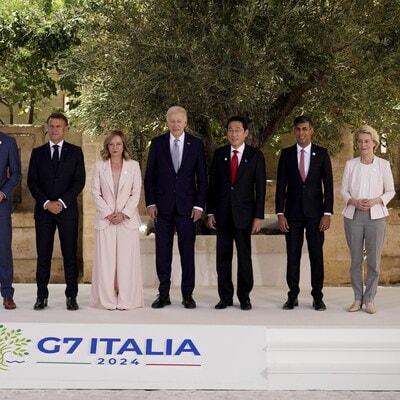From left to right: US President Joe Biden, Italian Premier Giorgia Meloni, French President Emmanuel Macron, Canadian Prime Minister Justin Trudeau, German Chancellor Olaf Scholz, European Council President Charles Michel, and Japanese Prime Minister Fumio Kishida
In a joint statement issued following their three-day summit in Italy, the Group of Seven (G7) countries committed to supporting particular infrastructure initiatives, such as the India-Middle East-Europe Economic Corridor (IMEC).
The G7 wants to improve economic corridors to attract more investments and improved infrastructure. Coordination and funding of initiatives for corridors such as the Lobito, Luzon, Middle, and India-Middle East-Europe are important undertakings.
Additionally, they intend to expand on current projects such as Italy’s Mattei Plan for Africa, the Great Green Wall, and the EU Global Gateway.
“We will further promote concrete G7 PGII initiatives, flagship projects, and complementary initiatives to develop transformative economic corridors for quality infrastructure and investment, such as the deepening of our coordination and financing for the Lobito Corridor, the Luzon Corridor, the Middle Corridor, and the India-Middle East-Europe Economic Corridor, also building on the EU Global Gateway, the Great Green Wall Initiative, and, the Mattei Plan for Africa launched by Italy,” the White
The leaders of the G7 Summit reiterated on Friday their commitment to an Indo-Pacific region that is open and free and is ruled by international law.
“We reiterate our commitment to a free and open Indo-Pacific, based on the rule of law, which is inclusive, prosperous, and secure, grounded on sovereignty, territorial integrity, peaceful resolution of disputes, fundamental freedoms, and human rights,” the White House stated in a statement.
The summit statement emphasised that the G7 would keep taking action to shield firms from unfair tactics, level the playing field, and address ongoing harm, rather than deliberately punish China or impede its economic development.
“We aspire to positive and stable relations with China and understand the value of open communication to voice concerns and resolve disagreements. In the interest of our country, we act. We continue to cooperate in areas of shared interest because, given China’s standing in the international community, collaboration is essential to addressing global concerns, the statement said.
“We call on China to step up efforts to promote international peace and security, and to work with us to tackle the climate, biodiversity, and pollution crises, combat illicit synthetic drug trafficking, ensure global macroeconomic stability, support global health security, and address vulnerable countries’ debt sustainability and financing needs,” said the statement.
The European Union and its seven members—the United States, United Kingdom, Canada, Germany, Italy, Japan, and France—participated in the summit. India was invited as a “Outreach Country” to the G7 summit, which took place in the Apulia area of Italy from July 13–15, by Italian Prime Minister Giorgia Meloni.
PM Modi spoke during the G7 Outreach Session on Africa, the Mediterranean, and AI and Energy. Among other topics, he spoke on the revolutionary role that technology plays in the advancement of humanity.
PM Modi met in private with the presidents of France, the UK, Italy, Japan, and Ukraine, as well as with Emmanuel Macron, Giorgia Meloni, Fumio Kishida, and Volodymyr Zelenskyy. These conversations took place on the fringes of the G7 Summit. Additionally, he spoke with Pope Francis, Canadian Prime Minister Justin Trudeau, German Chancellor Olaf Scholz, and US President Joe Biden.

